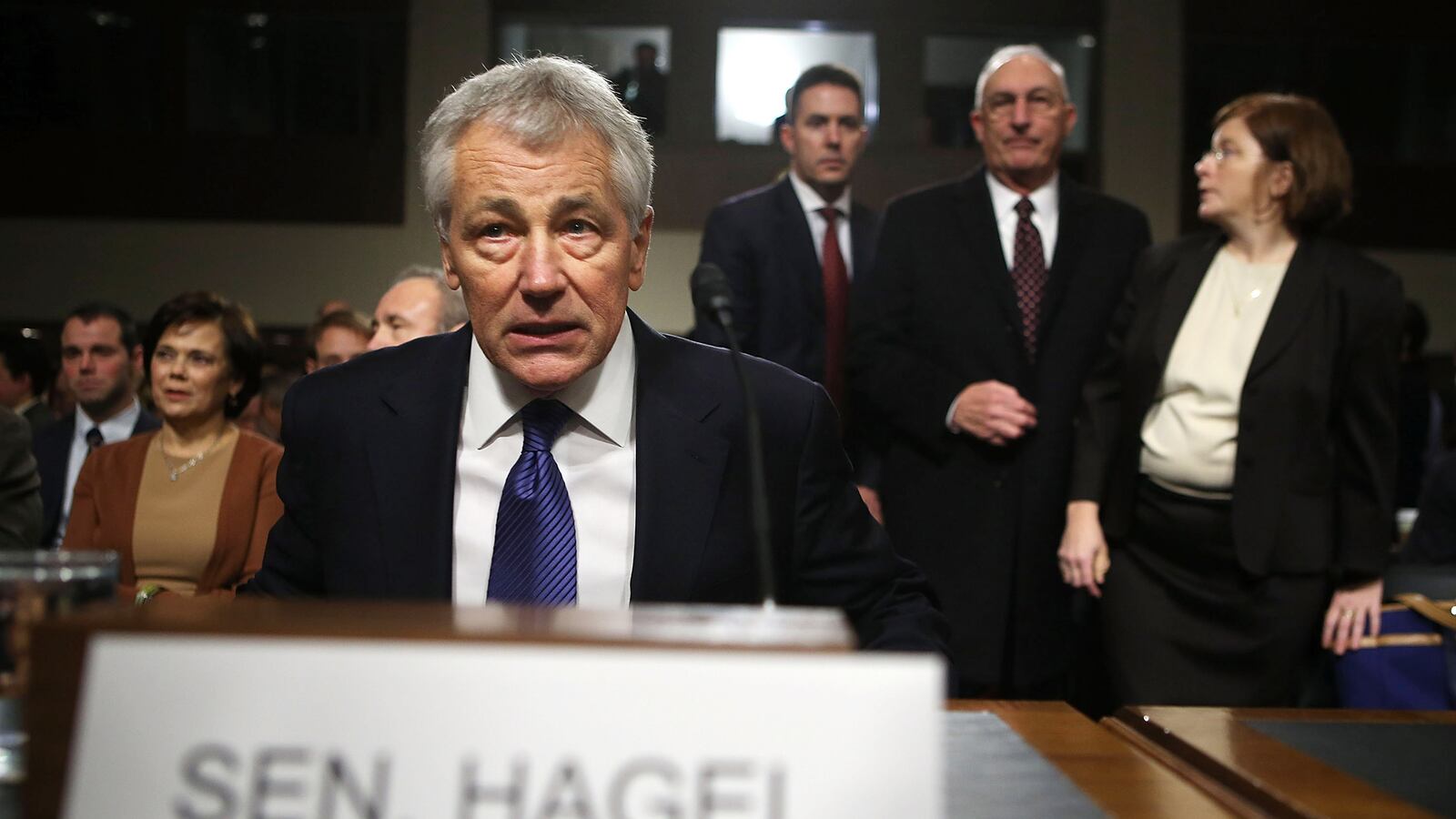The only people who performed more poorly at Chuck Hagel’s hearing to be secretary of defense than Hagel himself were the senators who questioned him. Again and again, they delivered bloviating, tendentious monologues and then cut Hagel off when he tried to reply. “I don’t want to interrupt you,” explained New Hampshire’s Kelly Ayotte, before interrupting him. When Hagel asked if he could respond to Ted Cruz’s lengthy insinuation that he was dishonest, if not corrupt, the newly elected Texas senator said there wasn’t time.
In addition to being rude, much of the questioning was barely relevant to the job Hagel is being nominated to hold. If confirmed, Hagel’s decisions about which weapons systems to fund and which to cut will shape America’s military posture for decades to come. But for the most part, the only senators who asked about specific weapons systems were the ones who represented the states that make them. Moreover, the U.S. military’s focus, as Hagel mentioned in his opening statement, is shifting to Asia. And in recent weeks, China and Japan have been drifting dangerously close to war. Yet China, the only country on earth capable of challenging America’ superpower status, was barely mentioned. There was little discussion of the merits of deeper U.S. military involvement in Syria or North Africa. And during the hours I spent listening to the hearings, I didn’t hear the word “drone” once, even though these unmanned killing machines have become the face America shows the Muslim world.

Instead, Republican senators bashed Hagel for supporting the abolition of nuclear weapons, for having opposed the surge in Iraq, for being insufficiently tough on Iran, and for being too tough on Israel. There are good answers to these charges, some of which Hagel has given in the past. When Republicans slammed him on nuclear weapons, Hagel could have noted that under the nuclear non-proliferation regime, reducing stockpiles among countries that already have nuclear weapons is crucial to preventing new nations from attaining them. And he could have noted that in supporting the goal of a nuclear-free world, he is echoing Ronald Reagan, Henry Kissinger, George Schultz, and Barack Obama, the guy Hagel will be working for.
When John McCain questioned Hagel’s judgment for having opposed the surge in Iraq, Hagel might have asked what exactly the surge achieved that was so crucial to American security that it was worth 1200 American lives. Or better yet, he might have reminded McCain that the Iraq War began not in 2006 with the surge, but with the 2003 decision to invade Iraq in the first place, and that given McCain’s unrepentant championing of that catastrophic decision, the Arizona senator is in no position to be lecturing anyone about foreign policy judgment.
On Iran, Hagel could have told his GOP tormenters that, yes, “all options should be on the table,” but reminded them that “all options” means not merely military force, but also the pursuit of a diplomatic deal. And he could have explained that just because we reserve the right to take military action does not mean we should ignore the numerous former military and intelligence officials, in both America and Israel, who warn that military action could produce a horrific regional war, strengthen the Iranian regime and ultimately make an Iranian nuclear weapon more likely, not less.
Finally, when asked to provide evidence for his claim that the “Jewish lobby” intimidates members of Congress, Hagel could have pointed to the hearings themselves. If the senators questioning Hagel weren’t interested in staying on AIPAC’s good side, would the hearings really have featured 136 mentions of Israel, 135 of Iran and only 27 references to Afghanistan, the country where the United States is currently at war? And instead of robotically restating his love of the Jewish state, Hagel could have said what many Israeli top security officials do: that Israel’s policy of subsidizing West Bank settlement causes immense Palestinian suffering and existentially threatens the Jewish state, and that ignoring that fact does Israel no favors.
But Hagel said none of these things. Instead he tried to convince his interrogators that he and they agree; that he’s “in the mainstream.” And in so doing he neutered himself because what makes Hagel compelling is precisely his break from a congressional mainstream that has learned nothing from the blood-soaked disasters in Iraq and Afghanistan. When Hagel talks about the difference between war’s ghastly reality and the antiseptic way in which it is discussed in Washington, and when he describes how the dishonest selling of the Iraq War awakened in him a fury he had been suppressing since his days as a grunt in Vietnam, he’s not only authentic, he’s eloquent. I suspect that’s what made him compelling to Obama, who after being pressured into supporting an Afghan surge he never really believed in, wants to surround himself with people willing to stand up to the mainstream assumptions that have served America so poorly over the last decade.
But that Chuck Hagel didn’t come through yesterday because instead of speaking from the gut, he said what he thought other politicians wanted to hear. That strategy failed because right-wingers like McCain, Graham and Cruz saw Hagel’s ideological incoherence and smelled his political fear. And it failed because Hagel shouldn’t have been speaking to the armed services committee. He should have been speaking over them, to the majority of Americans who voted for Obama, twice, in part because they want a leader who will break with the foreign policy thinking that has brought us a decade of endless war.
I blame team Obama. The only reason to choose Hagel was to challenge the mindless hawkishness that still dominates so much beltway foreign policy debate. If they didn’t want to have that argument, the administration should have chosen someone safe like Michelle Flournoy. Because whatever Hagel’s strengths, imitating Michelle Flournoy isn’t high among them.





